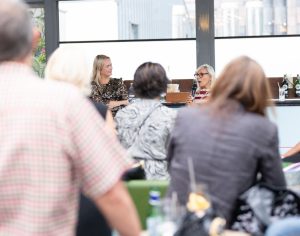A few short decades ago, global brands look set to rule the roost. With our high streets becoming increasingly homogenised and commerce the world over led by high-profile, international retailers, local communities’ relevance seemed to wane. And then as the internet bedded in to consumers’ habits, the shift seemed complete.
But, conspicuously, the tides that once seemed to be threatening the concept of local community trade have begun to recede. While social networks have connected people across the globe, they have also simultaneously sparked new conversations about the places in which we live. Geotagging has got us once again championing the wonderful eateries and exhibitions around us; near-field communications are stepping in to give us new ways of interacting with our immediate environment. Pop-up shops are getting us excited anew about the hidden gems on our high street. While we’re thinking global, as consumers and companies we’re acting local.
In part, the increasing focus within businesses on a local approach comes from the understanding that an outlet will often be dependent on a community. “Whether you’re a small business or even a big chain, it’s probably inevitable that a large proportion of your customers come from your local area,” says Jim Eastwood, regional director of the UK and Ireland at group discounting site Groupon. Indeed, research conducted by Groupon in April of this year revealed that increasing direct customer engagement was a priority for 67% of enterprises over the coming year. “The will and the desire is there among merchants because they realise that they have to evolve their marketing mix to suit the world that we’re living in.”
Eastwood feels that the shift toward digital marketing has been absolutely vital to respond to the changing habits of consumers. “That said though, it’s important businesses don’t neglect their face-to-face interactions,” he comments. “I think that’s extremely powerful and very necessary in order for SMEs to survive these days.” Something he stresses is that attracting new customers is invariably more expensive than forming and maintaining close relationships with the ones an enterprise already has. “We have to have a positive face-to-face interaction and if we don’t have that we feel duped or neglected.”
But sometimes establishing a connection in the local area isn’t necessarily that straightforward. Groupon generally advises the best thing enterprises can do is find ways to make contact with the people in their area. “So many things happen online and, even though they’re happening online, what actually increases that touch point and makes it more personal?” asks Eastwood. “We encourage partners to do seminars, demos, taster sessions, attend local events, do networking, attend local fairs or markets or shopping centres to promote their wares, host or sponsor an event or volunteer.”
As with most elements of marketing, however, the important thing is not so much how you employ individual elements but the ways in which they work together. “Applying a clear and consistent image and message across all of your communication channels for any business these days is vitally important,” explains Eastwood. And, actually, far from being the preserve of huge corporations, a consistent marketing message is actually something that can be easily achieved by SMEs. “Primarily, there’s one decision maker, one person who will oversee their marketing activities,” he continues. “They can have their signage, frontage, letterheads, business cards, decor, website, Groupon offering, Facebook page and Twitter profile consistent, professional, clear and inviting.”
While it’s tempting to forgo what is happening on your street in favour of the vast world of the web, our local communities still play a huge part in our daily lives. And making the most of this – without forgetting the benefits digital can bring – is the best way to ensure a long-lasting relationship with your consumer base.

The local picture
For gallery and photography school Manchester Photographic, engaging with the denizens of the city in which it’s based has been vital to its success. “Manchester is a very proud city and obviously excels at a lot of things,” explains Andrew Hill, the enterprise’s founder. From its well-established business community, the world-renowned football stadium at Old Trafford and its vibrant music history, Manchester has plenty to work with.
Manchester Photographic runs courses teaching individuals and organisations everything they need to know about photography, both at their own premises and in schools, corporations and local authorities. Their client roster has included homeless people, schoolchildren, academics, celebs, a Virgin exec and even a national newspaper editor. And the face-to-face time they spend with their clients ensures that there are always plenty more queueing up at the door. “I don’t have to do the marketing; they do it for me,” explains Hill. “They say, ‘Why don’t we have these guys? I’ve just been on a course down there and it really works.’”
The photography school is well respected not only for its training. It features plenty of exhibits, trading on the city’s reputation of being the birthplace of some of the UK’s greatest bands, from Joy Division and New Order to The Stone Roses and Happy Mondays. “We have fans from all over the world visiting the exhibits, plus all the locals who obviously love to see and reminisce over the pictures of old,” says Hill. “That’s a nice way of engaging the community.”
More importantly, it acts as another excellent way of getting the brand out into the public eye. “It’s a little bit viral; people get involved and get to know it,” he explains. This is the sort of word of mouth that some brands pay hundreds of thousands of pounds for and yet Manchester Photographic attracts it organically. “We did a Smiths exhibit earlier on this year and we had two pages in the Independent one weekend, and a page in the Telegraph.”
And the effort they put in pays dividends with their customers. “They know that we’re looking after their interests locally; we’re local people, we live locally,” Hill says. Rather than being seen as something corporate and impersonal, their customers relate to Manchester Photographic on an immediate, emotional level. “Once somebody’s been on a course, when they book on another one they go, ‘Who’s doing it? Is it John or is it Dave? I had a great time with them.’ And that’s the sort of relationship we try and build with them.” ![]()
Share via:








































